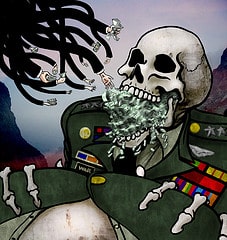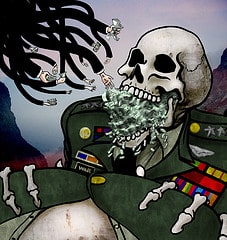Obama declared that the Afghanistan War was over, but Trump has renewed it. For the past 4 years, Trump made all sorts of strong unambiguous statements against being in this war. He favored hitting the exits and getting out of it. He’s now changed his mind, which seems to be a president’s typical habit concerning war-making. He’s sending many thousands more American soldiers to Afghanistan and into this 16-year old war.
Trump has embraced the concept of a “war on terror.” He’s working from that concept. The results will be as bad as they already have been in the first 16 years of this “war.”
What changed Trump’s mind? Trump was against nation-building, but he’s not against Afghan army-building on the notion that effective Afghan forces will prevent a Taliban takeover. The reason for preventing that, according to Trump’s new National Security Strategy document, is to prevent terrorist safe havens. But there’s really no difference between army-building and nation-building. Furthermore, this document spells out nation-building efforts explicitly. Trump, immersed in flawed Washington group-think, gave in because he never had a firm and nuanced alternative way of thinking about the problem of terrorism. He was ripe for being persuaded that Afghanistan is somehow critical to the US when it really is not.
The word “Afghanistan” occurs five times in this document. The first says “…engagement in Afghanistan seeks to prevent the reemergence of terrorist safe havens.” The idea that destroying safe havens destroys terrorism or makes America and Europe safer is a myth. See here and here.
The technology of terrorism can be decentralized and spread far and wide. States and societies are porous; space can be found in many places. The mentality that accompanies a terrorist’s actions is unrestricted by space. The notion of safe haven being critical is a conventional war notion. It hews to the image of blowing up factories and warehouses behind the enemy’s lines. The safe haven idea is as wrong as the idea of a war on terror. The people who advise presidents are wedded to outdated and inapplicable notions of warring on terrorism. If they knew what they were doing, would they have nurtured ISIS, wrecked Libya, and still be fighting in Afghanistan? There are special forces in 80 countries and they are being replaced by conventional forces: “…the US has expanded its counterterrorism operations over the last year, including Yemen, Somalia, Niger and Syria.” How successful is Pentagon thinking about safe havens when it causes their dispersion and multiplication?
The second mention refers to European troops committed “…to help fight jihadist terrorists in Afghanistan…”. The third mention says that the US seeks “…a stable and self-reliant Afghanistan.” That’s nation-building. The next reference says “We will continue to partner with Afghanistan to promote peace and security in the region.” This appears in a section on South and Central Asia and terrorism again, which posits that the national security of America depends on what happens in this region. This is an extravagant idea. Can Americans not be secure without policing the entire world? Is this region essential because it happens that bin Laden had some training camps there? The fifth mention of Afghanistan promises “to promote anti-corruption reform in Afghanistan to increase the legitimacy of its government and reduce the appeal of violent extremist organizations”. This is nation-building, something the US fails at, time and again. The Pentagon can’t keep track of its personnel, its equipment, and the money it spends. It’s a prime source of corruption in Afghanistan.
Reprinted with permission from LewRockwell.com.


